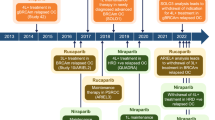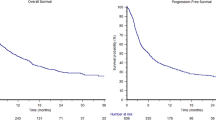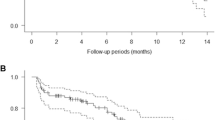Abstract
Purpose
To review the treatment of metastatic renal cell carcinoma (RCC), including the use of new targeted therapies.
Methods
A search of MEDLINE (1966 to August 2008) and American Society of Clinical Oncology Meeting abstracts (2005 to May 2008) was preformed using the search terms bevacizumab, everolimus, interferon-alfa (IFN-α), interleukin-2 (IL-2), sorafenib, sunitinib, temsirolimus, and RCC. Articles most pertinent to the treatment of metastatic RCC are reviewed.
Results
The treatment of metastatic RCC has undergone a paradigm shift over the past 5 years from biologic response modifiers to new targeted therapies. Historically, response rates for the biological response modifiers, aldesleukin (IL-2), and IFN-α were approximately 15%. Recently, three targeted agents, sorafenib, sunitinib, and temsirolimus have been approved for the treatment of RCC. Additionally, bevacizumab has been investigated and shown to increase progression free survival in RCC. IL-2 remains the only agent to induce complete, durable remissions; however, many patients are not eligible for this therapy. Newer agents (sorafenib, sunitinib, and temsirolimus) have shown to be superior to IFN-α or placebo and bevacizumab combined with IFN-α has shown activity when compared to IFN-α alone. Unlike IL-2, the greatest benefit obtained with targeted therapies is in achieving stable disease (SD). Despite their benefit, targeted therapies have never been compared with each other in clinical trials and choosing the most appropriate agent remains challenging. To date, the optimal sequence or combination of treatments has not been defined; however, everolimus has recently demonstrated activity in patients progressing on targeted therapy.
Conclusions
IL-2 remains the most active regimen in inducing complete responses; however, its use is accompanied by substantial morbidity and is limited to those with a good performance status. Targeted therapies are also efficacious in the treatment of RCC, with the major benefit being induction of SD. Future research will better define the sequencing of therapies, as well as, explore the activity of novel combination regimens.

Similar content being viewed by others
References
Jemal A, Siegel R, Ward E et al (2008) Cancer Statistics, 2008. CA Cancer J Clin 58:71–96
National Cancer Care Network (2008) Kidney cancer V.1.2008. www.nccn.org/professionals/physician_gls/PDF/kidney.pdf. Accessed 1 March 2008
Kim HL, Seligson D, Liu X et al (2005) Using tumor markers to predict the survival of patients with metastatic renal cell carcinoma. J Urol 173:1496–1501
Mancuso A, Sternberg CN (2005) New treatments for metastatic kidney cancer. Can J Urol 12(Suppl 1):66–70
Cohen HT, McGovern FJ (2005) Renal-cell carcinoma. N Engl J Med 353:2477–2490
National Cancer Institute, DCCPS, Surveillance Research Program, Cancer Statistics Branch (2008) Surveillance, Epidemiology and End Results (SEER) Program Stat Database. www.seer.cancer.gov. Accessed 3 Mar 2008
Motzer RJ, Mazumdar M, Bacik J et al (1999) Survival and prognostic stratification of 670 patients with advanced renal cell carcinoma. J Clin Oncol 17:2530–2540
Motzer RJ, Bacik J, Mazumdar M (2004) Prognostic factors for survival of patients with stage IV renal cell carcinoma: Memorial Sloan-Kettering Cancer Center experience. Clin Cancer Res 10:6302S–6303S
Yagoda A, Abi-Rached B, Petrylak D (1995) Chemotherapy for advanced renal-cell carcinoma: 1983–1993. Semin Oncol 22:42–60
Fyfe G, Fisher RI, Rosenberg SA et al (1995) Results of treatment of 255 patients with metastatic renal cell carcinoma who received high-dose recombinant interleukin-2 therapy. J Clin Oncol 13:688–696
Fisher RI, Rosenberg SA, Fyfe G (2000) Long-term survival update for high-dose recombinant interleukin-2 in patients with renal cell carcinoma. Cancer J Sci Am 6(Suppl 1):S55–S57
Product information (2007) Proleukin (aldesleukin). Novartis Pharmaceuticals Corporation, East Hanover
Yang JC, Sherry RM, Steinberg SM et al (2003) Randomized study of high-dose and low-dose interleukin-2 in patients with metastatic renal cancer. J Clin Oncol 21:3127–3132
Mcdermott DF, Regan MM, Clark JI et al (2005) Randomized phase III trial of high-dose interleukin-2 versus subcutaneous interleukin-2 and interferon in patients with metastatic renal cell carcinoma. J Clin Oncol 23:133–141
Fossa SD (2000) Interferon in metastatic renal cell carcinoma. Semin Oncol 27:187–193
Minasian LM, Motzer RJ, Gluck L et al (1993) Interferon alfa-2a in advanced renal cell carcinoma: treatment results and survival in 159 patients with long-term follow-up. J Clin Oncol 11:1368–1375
Quesada JR (1989) Role of interferons in the therapy of metastatic renal cell carcinoma. Urology 34(Suppl 4):80–83
Pyrhonen S, Salminen E, Ruutu M et al (1999) Prospective randomized trial of interferon alfa-2a plus vinblastine versus vinblastine alone in patients with advanced renal cell cancer. J Clin Oncol 17:2859–2867
Ritchie A, Griffiths G, Parmar M et al (1999) Interferon-α and survival in metastatic renal cell carcinoma: early results of a randomized controlled trial. Lancet 353:14–17
Coppin C, Porzsolt F, Autenrieth M, Kumpf J, Coldman A, Wilt T (2004) Immunotherapy for advanced renal cell cancer. Cochrane Database Syst Rev (3):CD001425. doi: 10.1002/14651858.CD001425.pub2
Product information (2008) Intron-A (interferon-α2b). Shering Corporation, Kenilworth
Mancuso A, Sternberg CN (2006) New treatment approaches in metastatic renal cell carcinoma. Curr Opin Urol 16:337–341
Product information (2008) Nexavar (sorafenib). Bayer Pharmaceuticals Corporation, West Haven
Escudier B, Eisen T, Stadler WM et al (2007) Sorafenib in advanced clear-cell renal-cell carcinoma. N Engl J Med 356:125–134
Gollob JA, Rathmell WK, Richmond TM et al (2007) Phase II trial of sorafenib plus interferon alfa-2b as first- or second-line therapy in patients with metastatic renal cell cancer. J Clin Oncol 25:3288–3295
Ryan CW, Goldman BH, Lara PN Jr et al (2007) Sorafenib with interferon alfa-2b as first-line treatment of advanced renal carcinoma: a phase II study of the Southwest Oncology Group. J Clin Oncol 25:3296–3301
Szczylik C, Demkow T, Staehler M et al (2007) Randomized phase II trial of first-line treatment with sorafenib versus interferon in patients with advanced renal cell carcinoma: final results. J Clin Oncol 25(Suppl 18) (abstract 5025)
Motzer RJ, Hutson TE, Tomczak P et al (2007) Sunitinib versus interferon alfa in metastatic renal-cell carcinoma. N Engl J Med 356:115–124
Figlin R, Hutson TE, Tomczak P et al (2008) Overall survival with sunitinib versus interferon (IFN)-alfa as first-line treatment of metastatic renal cell carcinoma (mRCC). J Clin Oncol 26(Suppl 18) (abstract 5024)
Motzer RJ, Michaelson MD, Redman BG et al (2006) Activity of SU11248, a multitargeted inhibitor of vascular endothelial growth factor receptor and platelet-derived growth factor receptor, in patients with metastatic renal cell carcinoma. J Clin Oncol 24:16–24
Motzer RJ, Michaelson MD, Rosenberg J et al (2007) Sunitinib efficacy against advanced renal cell carcinoma. J Urol 178:1883–1887
Hudes G, Carducci M, Tomczak P et al (2007) Temsirolimus, interferon alfa, or both for advanced renal-cell carcinoma. N Engl J Med 356:2271–2281
Escudier B, Pluzanska A, Koralewski P et al (2007) Bevacizumab plus interferon alfa-2a for treatment of metastatic renal cell carcinoma: a randomised, double-blind phase III trial. Lancet 370:2103–2111
Rini BI, Halabi S, Rosenberg J et al (2008) A phase III trial of bevacizumab plus interferon-alpha versus interferon-alpha monotherapy in metastatic renal cell carcinoma. In: Genitourinary cancer symposium, American Society of Clinical Oncology, San Francisco (abstract 350). http://www.asco.org/ASCO/Abstracts+%26+Virtual+Meeting/Abstracts?&vmview=abst_detail_view&confID=54&abstractID=20357. Accessed 17 Apr 2008
Yang JC, Haworth L, Sherry RM et al (2003) A randomized trial of bevacizumab, an anti-vascular endothelial growth factor antibody, for metastatic renal cancer. N Engl J Med 349:427–434
Product information (2008) Sutent (sunitinib). Pfizer, Inc, New York
Pouessel D, Culine S (2008) High frequency of intracerebral hemorrhage in metastatic renal carcinoma patients with brain metastases treated with tyrosine kinase inhibitors targeting vascular endothelial growth factor receptor. Eur Urol 53:376–381
Porta C, Paglino C, Imarisio I (2008) Re: Pouessel D, Culine S. High frequency of intracerebral hemorrhage in metastatic renal carcinoma patients with brain metastases treated with tyrosine kinase inhibitors targeting vascular endothelial growth factor receptor. Eur Urol 53:1092–1093 (comment)
Wu S, Chen JJ, Kudelka A et al (2008) Incidence and risk of hypertension with sorafenib in patients with cancer: a systematic review and meta-analysis. Lancet Oncol 9:117–123
Chu TF, Rupnick MA, Kerkela R et al (2007) Cardiotoxicity associated with tyrosine kinase inhibitor sunitinib. Lancet 370:2011–2019
Yang CH, Lin WC, Chuang CK et al (2008) Hand-foot skin reaction in patients treated with sorafenib: a clinicopathological study of cutaneous manifestations due to multitargeted kinase inhibitor therapy. Br J Dermatol 158:592–596
Rosenbaum SE, Wu S, Newman MA et al (2008) Dermatological reactions to the multitargeted tyrosine kinase inhibitor sunitinib. Support Care Cancer 16:557–566
Product information (2007) Torisel (temsirolimus). Wyeth Pharmaceuticals Inc, Philadelphia
Product information (2008) Avastin (bevacizumab). Genentech, Inc, San Francisco
Genentech (2008) Important drug warning subject: microangiopathic hemolytic anemia (MAHA) in patients treated with Avastin® (bevacizumab) and sunitinib malate. http://www.fda.gov/medwatch/safety/2008/MAHA_DHCP.pdf. Accessed 1 Sept 2008
Tamaskar I, Garcia JA, Elson P et al (2008) Antitumor effects of sunitinib or sorafenib in patients with metastatic renal cell carcinoma who received prior antiangiogenic therapy. J Urol 179:81–86
Drabkin HA, Figlin R, Stadler WM et al (2007) The Advanced Renal Cell Carcinoma Sorafenib (ARCCS) expanded access trial: Safety and efficacy in patients with prior bevacizumab treatment. J Clin Oncol 25(Suppl 18) (abstract 5041)
George DJ, Michaelson MD, Rosenberg J et al (2007) Phase II trial of sunitinib in bevacizumab-refractory metastatic renal cell carcinoma (mRCC): updated results and analysis of circulating biomarkers. J Clin Oncol 25(Suppl 18) (abstract 5035)
Feldman DR, Ginsberg MS, Baum C et al (2008) Phase I trial of bevacizumab plus sunitinib in patients with metastatic renal cell carcinoma. J Clin Oncol 26(Suppl 18) (abstract 5100)
Sosman JA, Flaherty KT, Atkins MB et al (2008) Updated results of phase I trial of sorafenib (S) and bevacizumab (B) in patients with metastatic renal cell cancer (mRCC). J Clin Oncol 26(Suppl 18) (abstract 5011)
Merchan JR, Liu G, Fitch T et al (2007) Phase I/II trial of CCI-779 and bevacizumab in stage IV renal cell carcinoma: phase I safety and activity results. J Clin Oncol 25(Suppl 18) (abstract 5034)
Ratain MJ, Eisen T, Stadler WM et al (2006) Phase II placebo-controlled randomized discontinuation trial of sorafenib in patients with metastatic renal cell carcinoma. J Clin Oncol 24:2505–2512
Choueiri TK, Plantade A, Elson P et al (2008) Efficacy of sunitinib and sorafenib in metastatic papillary and chromophobe renal cell carcinoma. J Clin Oncol 26:127–131
Stadler WM, Figlin R, Ernstoff MS et al (2007) The Advanced Renal Cell Carcinoma Sorafenib (ARCCS) expanded access trial: safety and efficacy in patients with non-clear cell renal cell carcinoma. J Clin Oncol 25(Suppl 18) (abstract 5036)
Dutcher JP, Wilding G, Hudes GR et al (2008) Sequential axitinib (AG-013736) therapy of patients (pts) with metastatic clear cell renal cell cancer (RCC) refractory to sunitinib and sorafenib, cytokines and sorafenib, or sorafenib alone. J Clin Oncol 26(Suppl 18) (abstract 5127)
Rini BI, Wilding G, Hudes G et al (2007) Axitinib (AG-013736; AG) in patients (pts) with metastatic renal cell cancer (RCC) refractory to sorafenib. J Clin Oncol 25(Suppl 18) (abstract 5032)
Hutson TE, Davis ID, Machiels JP et al (2007) Pazopanib (GW786034) is active in metastatic renal cell carcinoma (RCC): interim results of a phase II randomized discontinuation trial (RDT). J Clin Oncol 25 (Suppl 18) (abstract 5031)
Ravaud A, Gardner R, Hawkins R et al (2006) Efficacy of lapatinib in patients with high tumor EGFR expression: results of a phase III trial in advanced renal cell carcinoma. J Clin Oncol 24(Suppl 18) (abstract 4502)
Motzer RJ, Escudier B, Oudard S et al (2008) Efficacy of everolimus in advanced renal cell carcinoma: a double-blind, randomized, placebo-controlled phase III trial. Lancet 372:449–456
LaGow B (ed) (2008) Red book. Thompson Healthcare, Montvale
Klatte M, Zomorodian N, Kabbinavar FF, Belldegrun AS, Pantuck AJ (2007) Prospective evaluation of carbonic anhydrase IX (CAIX) as a molecular marker in metastatic renal cell carcinoma. J Clin Oncol 25 (Suppl 18) (abstract 5112)
Conflict of interest statement
None.
Author information
Authors and Affiliations
Corresponding author
Rights and permissions
About this article
Cite this article
Reeves, D.J., Liu, C.Y. Treatment of metastatic renal cell carcinoma. Cancer Chemother Pharmacol 64, 11–25 (2009). https://doi.org/10.1007/s00280-009-0983-z
Received:
Accepted:
Published:
Issue Date:
DOI: https://doi.org/10.1007/s00280-009-0983-z




